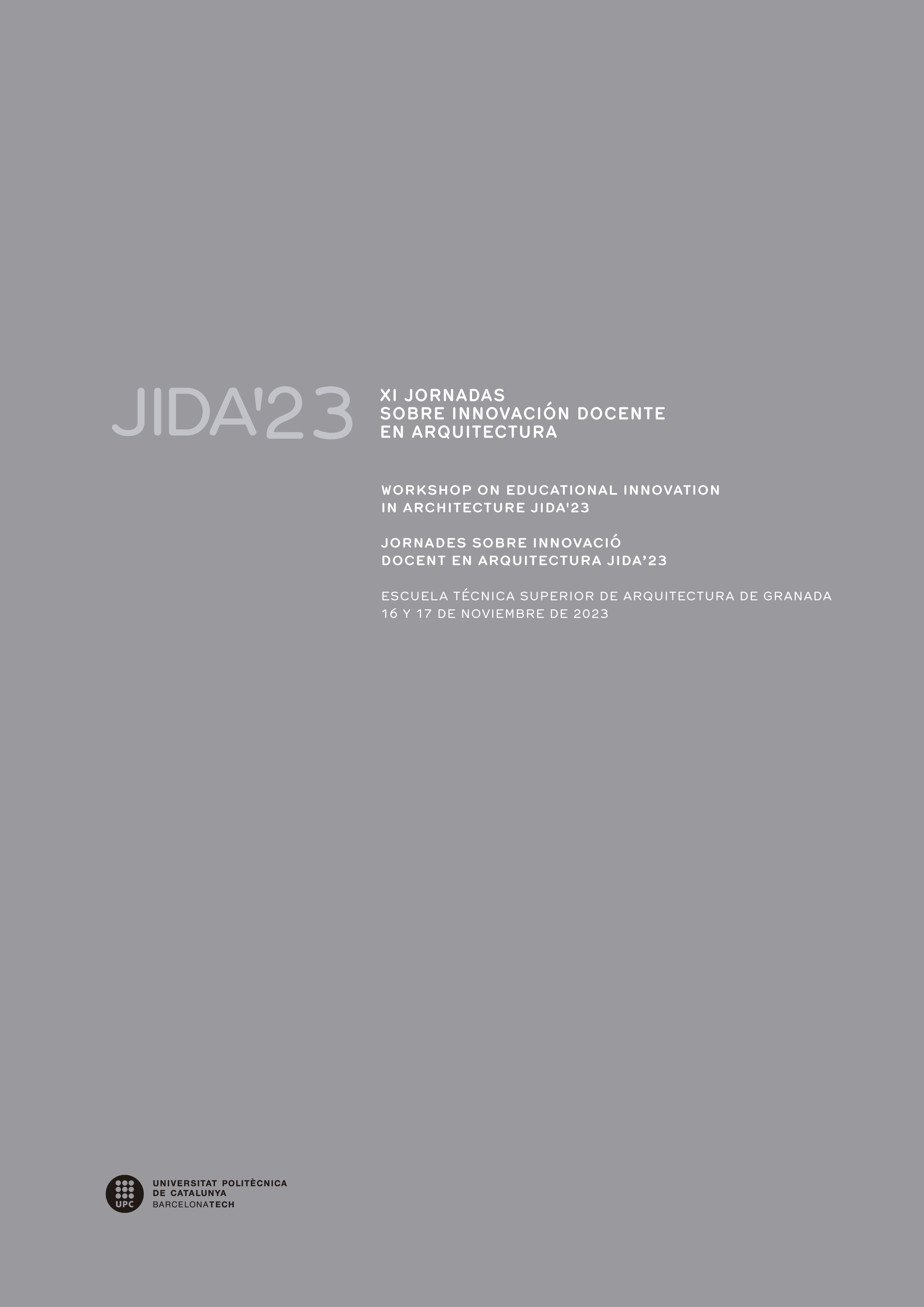Más allá del estado estable: diseño discursivo como práctica reflexiva asistida por IA
disseny discursiu com a pràctica reflexiva assistida per IA
DOI:
https://doi.org/10.5821/jida.2023.12146Palabras clave:
inteligencia artificial (IA), diseño arquitectónico, tecno-pedagogías, diseño discursivo, educación en líneaResumen
Este artículo examina cómo la inteligencia artificial (IA) puede enriquecer la enseñanza del diseño arquitectónico en un contexto de educación en línea. A través de un curso-taller para docentes, se introduce la IA en tecno-pedagogías y diseño discursivo. El enfoque pedagógico se basa en el aprendizaje activo y reflexivo. Los docentes aplican la IA en diversas fases del diseño, abordando cuestiones éticas y sociales. Los resultados muestran que la IA ofrece herramientas valiosas para la enseñanza, aunque también plantea preocupaciones éticas. El estudio concluye que la IA tiene potencial para fomentar la creatividad y el pensamiento crítico en la enseñanza de la arquitectura.
Citas
Argyris, C., & Schön, D. A. (1978). "Organizational Learning: A Theory of Action Perspective." Reading, MA: Addison-Wesley.
Bardzell, J., & Bardzell, S. (2013). "What is 'Critical' about Critical Design?" Proceedings of the SIGCHI Conference on Human Factors in Computing Systems, pp. 3297-3306.
Bates, T. (2019). "Teaching in a Digital Age: Guidelines for Designing Teaching and Learning." Vancouver, BC: Tony Bates Associates Ltd.
Brown, A. (2020). "Higher Education in the Era of the Fourth Industrial Revolution." Palgrave Macmillan.
Brown, J. (2020). "Transforming Higher Education: The Role of AI." Journal of Educational Technology, 12(3), 45-60.
Brynjolfsson, E., & McAfee, A. (2014). "The Second Machine Age: Work, Progress, and Prosperity in a Time of Brilliant Technologies." New York: W. W. Norton & Company.
Castells, M. (2011). "The Rise of the Network Society." Oxford: Blackwell Publishers.
Clark, R. (2019). "Tecno-pedagogies: The Intersection of Technology and Pedagogy." Journal of Online Learning, 7(2), 22-35.
Clark, R. E. (2019). "Learning from Media: Arguments, Analysis, and Evidence." Charlotte, NC: Information Age Publishing.
Creswell, J. W. (2014). "Research Design: Qualitative, Quantitative, and Mixed Methods Approaches." Thousand Oaks, CA: Sage Publications.
Davis, M. (2021). "Flexible Learning Models in Higher Education." Journal of Educational Innovation, 15(1), 18-32.
Dunne, A., & Raby, F. (2013). "Speculative Everything: Design, Fiction, and Social Dreaming." Cambridge, MA: MIT Press.
Eco, U. (1976). A Theory of Semiotics. Bloomington: Indiana University Press.
Foucault, M. (1980). "Power/Knowledge: Selected Interviews and Other Writings, 1972-1977." New York: Pantheon Books.
Freire, P. (1970). "Pedagogy of the Oppressed." New York: Continuum.
Fullan, M. (2016). "The New Meaning of Educational Change." New York: Teachers College Press.
Illeris, K. (2009). "Contemporary Theories of Learning." London: Routledge.
Johnson, B. (2018). "Ethics in the Age of Artificial Intelligence." Cambridge, MA: MIT Press.
Johnson, L. (2017). "NMC Horizon Report: 2017 Higher Education Edition." Austin, TX: The New Media Consortium.
Johnson, L. (2017). "The New Landscape of Mobile Learning: Redesigning Education in an App-Based World." New York: Routledge.
Knowles, M. S. (1975). "Self-Directed Learning." Chicago: Follett Publishing Company.
Kolb, D. A. (2014). "Experiential Learning: Experience as the Source of Learning and Development." Englewood Cliffs, NJ: Prentice Hall.
Kumar, M. (2019). "AI-enhanced Design: A Provocation Piece." She Ji: The Journal of Design, Economics, and Innovation, 5(4), 290-299.
Luckin, R. (2018). "Machine Learning and Human Intelligence: The Future of Education for the 21st Century." London: UCL Institute of Education Press.
Manovich, L. (2001). "The Language of New Media." Cambridge, MA: MIT Press.
Manzini, E. (2015). "Design, When Everybody Designs: An Introduction to Design for Social Innovation." Cambridge, MA: MIT Press.
Mezirow, J. (1997). "Transformative Learning: Theory to Practice." New Directions for Adult and Continuing Education, 1997(74), 5-12.
Moore, M. G. (2019). "Handbook of Distance Education." New York: Routledge.
Negroponte, N. (1995). "Being Digital." New York: Knopf.
Norman, D. A. (2013). "The Design of Everyday Things: Revised and Expanded Edition." New York: Basic Books.
Papanek, V. (1971). "Design for the Real World: Human Ecology and Social Change." New York: Pantheon Books.
Russell, S., & Norvig, P. (2021). "Artificial Intelligence: A Modern Approach." Upper Saddle River, NJ: Prentice Hall.
Schön, D. (1971). "Beyond the Stable State." New York: W. W. Norton & Company.
Schön, D. A. (1983). "The Reflective Practitioner: How Professionals Think in Action." New York: Basic Books.
Schwab, K. (2016). "The Fourth Industrial Revolution." New York: Crown Business.
Schwartz, B. (2021). "The Paradox of Choice: Why More Is Less." New York: Harper Perennial.
Schwartz, D. L. (2021). "The ABCs of How We Learn: 26 Scientifically Proven Approaches, How They Work, and When to Use Them." New York: W. W. Norton & Company.
Selwyn, N. (2016). "Is Technology Good for Education?" Cambridge: Polity Press.
Selwyn, N. (2016). "Education and Technology: Key Issues and Debates." London: Bloomsbury Academic.
Senge, P. M. (1990). "The Fifth Discipline: The Art and Practice of the Learning Organization." New York: Doubleday.
Solé Gras, A., et al. (2021). "A propósito de la escala dinámica como método de aprendizaje transversal." JIDA 8: Textos de Arquitectura Docencia e Innovación, pp. 173-186. ISBN 9788498809336.
Taleb, N. N. (2012). "Antifragile: Things That Gain from Disorder." New York: Random House.
Tharp, B. M., & Tharp, S. M. (2019). "Discursive Design: Critical, Speculative, and Alternative Things." Cambridge, MA: The MIT Press.
Tonkinwise, C. (2015). "How We Weave Now." Interaction Design and Architecture(s) Journal, 24, 87-96.
Wang, F. (2020). "Educational Technology: Leadership Perspectives." Charlotte, NC: Information Age Publishing.
Wang, Y. (2020). "The Role of Artificial Intelligence in Transforming Higher Education." Journal of Educational Technology, 12(4), 70-85.
Wheeler, S. (2015). "Learning with 'e's: Educational Theory and Practice in the Digital Age." Carmarthen: Crown House Publishing Limited.
Williams, A. (2019). "Posthumanism: A Guide for the Perplexed." London: Bloomsbury Academic.
Williams, R. (2019). "The Politics of Design: A (Not So) Global Manual for Visual Communication." Amsterdam: BIS Publishers.
Williams, S. (2019). "Tecno-pedagogies and Online Learning." Journal of Online Education, 6(1), 5-20.
Wingfield, B. (2020). "AI in Architectural Education: A Critical Overview." Journal of Architectural Education, 74(1), 89-100.
Zimmerman, A. (2020). "The Coronavirus Pandemic and Lessons for Preparedness." Journal of Public Health Policy, 41, 238-242.






















